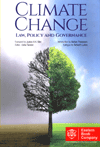- Author(s): Dr. Usha Tandon
- Publisher: Eastern Book Company
- Edition: Ed 2016
- ISBN 13 9789351453376
- Approx. Pages 343 + Contents
- Delivery Time Normally 7-9 working days
.............................................................................................................................
Description
The book contains twenty chapters elaborating three broad areas of climate change. The first few chapters deal with the conceptual analysis of the UNFCCC, the Kyoto Protocol and related principles. The next few chapters deal with experiences of various countries including China, Nigeria, Indonesia, Iran etc. in dealing with the implementation of the UNFCCC and the Kyoto Protocol at the domestic level. The chapters in the last section of the book deal with the human rights aspect of climate change.
The book bring outs that climate change has so far been, primarily, a science and technology issue. The socio-legal aspects of climate-change have been neglected and have not been fully explored. It highlights that this neglect has lead to the violation of human rights, especially, rights to life, health, food, water and housing etc. Thus international human rights institutions and regimes should be mobilized to redress individuals affected by harm induced by climate change. One of the scholars goes to the extent of urging the re-structuring of UNFCCC on 'rights based approach' which refers to the 'right of the nature'.
The principle of Common but Differentiated Responsibilities and Respective Capabilities (CBDR RC) attracted the serious attention of a few researchers. The book explains that some of the countries regard climate change as primarily a question of retrospective responsibility, while others advocate for intra-generational and inter-generational equity. The north and south divide, that climate change was about the responsibility or the solidarity, is also investigated in the book. The middle path suggested herein is to develop a hybrid narrative which would reconcile moral aspirations with pragmatic constrains by "talking ethically to states interests".
The problems of climate refugees that constitute a special category of victims of human rights violations have also been critically analyzed in the book. The inadequacy of legal framework and problems in good governance of climate migration, the urgent need to assess the applicability of general international refugee law to 'climate refugees" have been highlighted in it. It also stresses the need to define the meaning and scope of 'climate refugees' to address their woes by legal mechanism.
It is, argued that the expansion of globalisation over the last decades has made social security more necessary than ever for people affected by climate change. The question of the role of social protection mechanisms in climate change adaptation and mitigation efforts has been debated in the book. It recommends that strong Social Security Laws can play a powerful
.............................................................................................................................
Contents
I. Justifying Climate Cooperation: Competing Narratives in a Divided World
II. UNFCCC, KYOTO protocol & Developing Countries Solidarity in a divided world
III. Revisiting the No-Responsbility for Climate change under common
but differentiated Responsibility
IV. UNICFCCC and precautionary principle
V. Analysis Kyoto protocol and its Negotiation process: with special
Emphasis on its Compliance System
VI. Mitigation of Climate Change : Exploring laws and policies of china
and India in Changing paradigm
VII. Current Achievements and Future Challenges an Appraisal of china's
pilot Regional Carbon Emission Trading System
VIII. The Local Government Policy to Perform Environmental
Performance in REDD+Program in the Context of Unitary State of Indonesia
IX. The Clean Development Mechanism (CDM) and the Challenge of
Compliance with the CDM Rules in Nigeria
X. Organization of Petroleum Exporting Countries (OPEC) Versus of the
International Kyoto Protocol in the Persian Gulf Region: Problems and
Prospects
XI. Indonesian Climate Law and Institutional Arrangement
XII. The Role of Nigerian Judiciary in Mitigating Climate Change and Post-2015
Lessons for Other Developing Countries
XIII. Climate Change and Human Rights: Issues of Attribution and Jurisdiction
XIV. Human Rights and Climate Change
XV. Climate change, Migration and Environmental Justice
XVI. Impacts of Climate Change on Fisheries and Fishermen in the Coastal Zone
of Bangladesh: A Study after Three Devastating Cyclones
XVII. Responsibility for Global Climate Change: A Case Stu of Nepal with
Special Focus on Displacements of Indigenous Groups
XVIII. The Role of Social Protection Mechanisms in Climate Chan; Mitigation in India
XIX. Re-Structuring the United Nations Framework Convention on Climate
Change Based on the Right of Nature - A Nature Rights-Based Approach
to Combat Climate Change
XX. Population Growth, Climate Change and the Law With Spec Reference
to India
.............................................................................................................................

